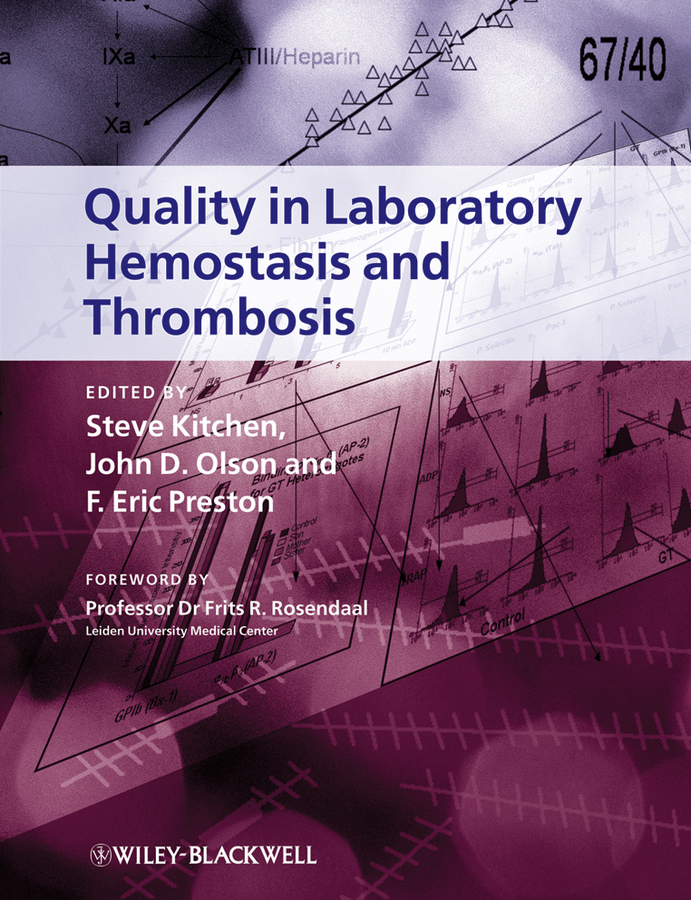
Quality in laboratory hemostasis and thrombosis
Kitchen, Steve
Olson, John
Preston, Eric
“Over the last decades, major progress has been made in quality assurance of hemostatic laboratory assays. This book will be an indispensable part ofevery hemostasis laboratory, where, given its hands-on nature, it will rarelysit to get dusty on the shelves.” - Frits R. Rosendaal, Leiden University Medical CenterThe hemostasis laboratory has a vital role in the diagnosis and management of patients with familial and acquired hemorrhagic and thrombotic disorders. Its role in the monitoring traditional anticoagulant therapy as well as therapy using new anticoagulants presents new challenges to the laboratory. Quality in Laboratory Hemostasis and Thrombosis not only addresses these important issues, but also covers international guidelines for testing, the development of international standard materials, management of hemostasis testing from the laboratory to the point of care as well as molecular genetic testing.Designed as a guide for all those working in hemostasis laboratories, this book details a quality program that, when put into place, will help to improve standards in testing. All of the authors are internationally recognised for their work in hemostasis and thrombosis. Using their experience, they provide information on standards, equipment and methods that will guide the development of a quality program to support all activities in the hemostasis laboratory. Eric Preston MD, FRCP, FRCPathProfessor Preston is Emeritus Professor of Haematology at the University of Sheffield since 2000, having been Professor ofHaematology in the same University from 1986 – 2000. He was Director ofthe Sheffield Haemostasis and Thrombosis Centre from 1973 – 2000. He isa past President of the British Society for Haematology and also the British Society for Haemostasis and Thrombosis. During the period 1992 – 2005 hewas Director of the UK National External Quality Assessment Scheme (UKNEQAS) for Blood Coagulation. He continues as Director of the WHO International External Quality Assessment Program for Blood Coagulation testing for Developing Countries and also as Director of the World Federation of Hemophilia (WFH) BloodCoagulation EQA program. Professor Preston has been a co-author on more than 250 publications in peer reviewed journals in the field of hemostasis and thrombosis. He is currently vice chairman of the newly formed international group devoted to EQA in hemostasis and thrombosis EQATH)Steve Kitchen PhDDr Steve Kitchen is currently the Scientific Director of the UK National External QualityAssessment Scheme for Blood Coagulation and is the Head Scientist for the WHOand World Federation of Haemophilia EQA programmes . He is the head scientistat the Sheffield Haemostasis and Thrombosis Centre. He has 25 years experience in the field of laboratory testing in haemostasis with a long standing interest in standardisation and has been involved in drawing up guidelines for a number of National and International bodies in the fieldJohn D. Olson, MD, PhDDrOlson is Professor of Pathology at the University of Texas Health Science Center at San Antonio and Director of Clinical Laboratories for the University Health Systems. He has had a continuing interest in haemostasis and thrombosis that has spanned his career of more than 30 years. Recently, he was the Chair of the Coagulation Resource Committee (1999 to 2004) of the College of AmericanPathologists. This committee a the largest external quality assurance programin haemostasis in North America. He has spoken at national and international meetings on the topic of quality in haemostasis. He is currently the chair of a newly formed international group of programs devoted to external quality assurance in haemostasis and thrombosis (EQATH). INDICE: Foreword, Frits R. Rosendaal.1. General Quality Planning in the Hemostasis Laboratory, John D. Olson.2. Hemostasis Test Validation, Performance and Reference Intervals: International Recommendations and Guidelines, RichardA. Marlar.3. International Standards in Hemostasis, Trevor W. Barrowcliffe.4.Sample Integrity and Preanalytical Variables, Dorothy M. Adcock.5. Internal Quality Control in the Hemostasis Laboratory, Steve Kitchen, F. Eric Preston, John D. Olson.6. External Quality Assessment in Hemostasis: Its Importance and Significance, F. Eric Preston, Steve Kitchen, Alok Srivastava.7. Initial Evaluation of Hemostasis: Reagent and Method Selection, Wayne L. Chandler.8. Point-of-Care Testing in Hemostasis. Chris Gardiner, Samuel Machin, Ian Mackie.9. Assay of Factor VIII and Other Clotting Factors, Steve Kitchen, F. Eric Preston.10. Application of Molecular Genetics to the Investigation of Inherited Bleeding Disorders, Stefan Lethagen, Marianne Schwartz, Lars Bo Nielson.11. Standardisation of D-dimer Testing, Guido Reber, Philippe de Moerloose.12. Diagnostic Assessment of Platelet Function, Paquita Nurden, Alan Nurden.13. Laboratory Evaluation of von Willebrand Disease: Phenotypic Analysis, Emmanuel J. Favaloro.14. Laboratory Analysis of von Willebrand Disease: Molecular Analysis, Anne Goodeve, Ian Peake.15. Dilemmas in Heritable Thrombophilia Testing, Isobel Walker, Ian Jennings .16. Evaluation of Antiphospholipid Antibodies, Michael Greaves.17. Monitoring Heparin Therapy, Marilyn Johnston.18. Monitoring Oral Anticoagulant Therapy, Armando Tripodi.19. Monitoring New Anticoagulants, Elaine Gray, Trevor W. Barrowcliffe.20. Detecting and Quantifying Functional Inhibitors in Hemostasis, Bert Verbruggen, Irena Nováková, Waander van Heerde
- ISBN: 978-1-4051-6803-8
- Editorial: Wiley-Blackwell
- Encuadernacion: Cartoné
- Páginas: 232
- Fecha Publicación: 01/12/2008
- Nº Volúmenes: 1
- Idioma: Inglés
